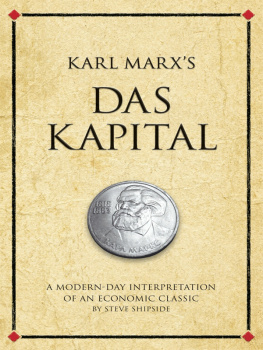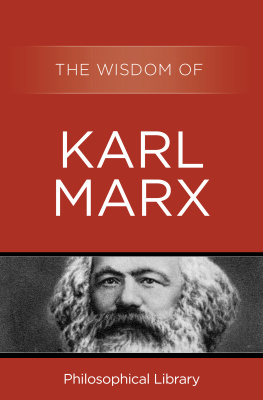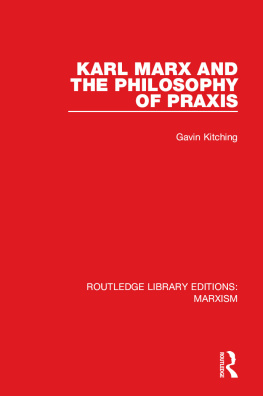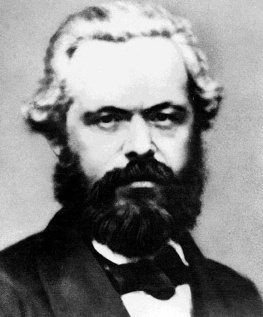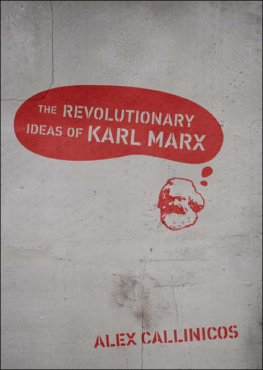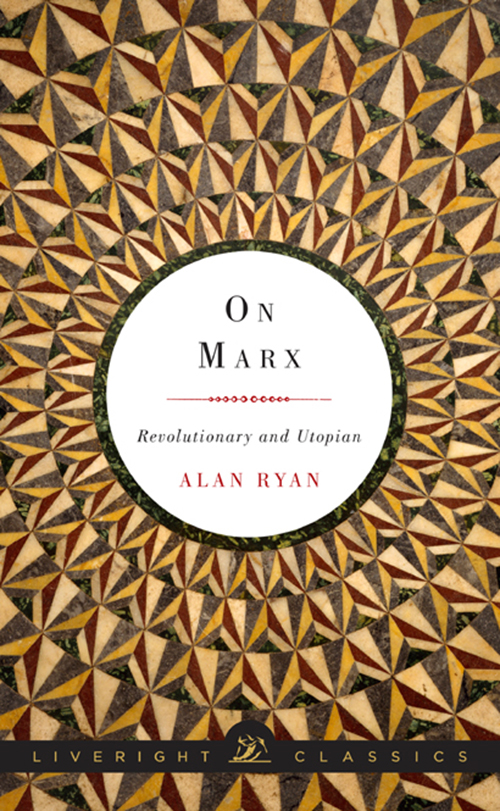
ALSO BY ALAN RYAN
On Tocqueville: Democracy and America
On Machiavelli: The Search for Glory
On Aristotle: Saving Politics from Philosophy
On Politics: A History of Political Thought:
From Herodotus to the Present
Liberal Anxieties and Liberal Education
John Dewey and the High Tide of American Liberalism
Bertrand Russell: A Political Life
Property
Property and Political Theory
J. S. Mill
The Philosophy of the Social Sciences
The Philosophy of John Stuart Mill
ON MARX
Revolutionary and Utopian

ALAN RYAN

LIVERIGHT PUBLISHING CORPORATION
A Division of W. W. Norton & Company
New York / London
Copyright 2014, 2012 by Alan Ryan
Portions previously published in On Politics: A History of
Political Thought: From Herodotus to the Present
All rights reserved
First Edition
For information about permission to reproduce selections from this book,
write to Permissions, Liveright Publishing Corporation,
a division of W. W. Norton & Company, Inc.,
500 Fifth Avenue, New York, NY 10110
For information about special discounts for bulk purchases, please contact
W. W. Norton Special Sales at specialsales@wwnorton.com or 800-233-4830
Book design by Ellen Cipriano
Production manager: Anna Oler
ISBN 978-0-87140-793-1
ISBN 978-0-87140-820-4 (e-book)
Liveright Publishing Corporation
500 Fifth Avenue, New York, N.Y. 10110
www.wwnorton.com
W. W. Norton & Company Ltd.
Castle House, 75/76 Wells Street, London W1T 3QT

I N THE INTRODUCTION TO On Politics, I suggested that one measure of the books success would be the readers who went and read the works of the authors I discussed. Some readers suggested that I might encourage them to do so by taking chapters of On Politics and adding to them substantial extracts from the works I hoped they would read. What follows is exactly that, with a short introduction to provide some of the context that the chapters original placement in On Politics would have provided. As before, I am grateful to Bob Weil and William Menaker at Liveright, as well as to the Norton production team, for their help in making an authors life as easy as it can plausibly be made.

| 1770 | Birth of Hegel |
| 1776 | Adam Smith publishes The Wealth of Nations |
| 1789 | French Revolution begins with storming of the Bastille |
| 1792 | France is declared a republic |
| 17921815 | Revolutionary and Napoleonic Wars |
| 17931814 | Rhineland is under French occupation |
| 1793 | The Terror begins in France; Louis XVI is executed |
| 1815 | Battle of Waterloo; the Bourbon monarchy is restored |
| 1818 | Marx is born in Trier on May 5 |
| 1820 | Birth of Friedrich Engels |
| 1821 | Publication of Hegels Philosophy of Right |
| 1830 | July Revolution; Charles X replaced by Louis-Philippe |
| 1831 | Death of Hegel in Berlin |
| 1835 | Marx enters the University of Bonn to study law |
| 1836 | Marx transfers to the University of Berlin |
| 1838 | Heinrich Marx dies |
| 1840 | Death of Frederick William III and accession of Frederick William IV |
| 1841 | Feuerbach publishes The Essence of Christianity; Marx obtains his doctorate |
| 184243 | Marx writes for, then edits, the Rheinische Zeitung until it is suppressed; marries Jenny von Westphalen in June 1843; moves to Paris |
| 1844 | Publishes essays in Deutsch-Franzsische Jahrbcher |
| 1845 | Expelled from France, Marx moves to Brussels; begins to write The German Ideology |
| 1846 | Publishes The Poverty of Philosophy, attacking Proudhons The Philosophy of Poverty; The German Ideology is finished but unpublished, left to the gnawing criticism of the mice. |
| 1847 | Creation of the Communist League; Marx and Engels are asked to draft its program |
| 1848 | February Revolution in France; revolution spreads to Germany; Louis Bonaparte is elected president of the Second French Republic |
| 1848 | Marx publishes Manifesto of the Communist Party (February) |
| 184849 | Marx edits the Neue Rheinische Zeitung in Cologne |
| 1849 | Marx moves to London permanently |
| 1851 | Louis Bonaparte seizes power in the coup dtat of December 2 |
| 185152 | Marx writes The Eighteenth Brumaire of Louis Bonaparte |
| 1852 | Louis Bonaparte becomes Emperor Napoleon III on December 2 |
| 1859 | Marx publishes A Contribution to the Critique of Political Economy |
| 1864 | Foundation of International Working Mens Association (the First International) (September) |
| 1867 | Marx publishes vol. 1 of Das Kapital |
| 1870 | Franco-Prussian War; Napoleon III abdicates; republican government is restored |
| 1871 | Short-lived (MarchMay) revolutionary government installed in Paris; Marx publishes The Civil War in France (address to the general council of the IWMA) on the Paris Commune |
| 1875 | Writes Critique of the Gotha Program (published posthumously) |
| 1881 | Marxs wife, Jenny, dies |
| 1883 | Marxs daughter, Jenny, dies in January; Marx dies in March |
| 1895 | Friedrich Engels dies |

T HE DISCUSSION OF MARX that follows these introductory pages has been taken from a long book, On Politics. There, it was given a context, not only by the discussions of particular authors and ideas that preceded and followed it but also by the question that provided the thread on which the discussion of individual thinkers and their ideas was strung. The history of political thought is in large part a series of answers to the question whether human beings are capable of self government and, if so, under what conditions. That was the question around which On Politics was constructed. Some writers take it for granted that small, tough city-states are paradigms of self-governing political communities; but then the question arises of how far self-government as a political community is compatible with the liberty of the individual, let alone how far the politics of tiny, long-vanished societies can provide a model for our own politics. Spartans would die to the last man to defend the autonomy of Sparta, but Sparta was at the opposite end of the spectrum from a society built around modern liberal ideals of individual liberty. Modern liberal democracy is sometimes offered as a compromise: individuals sacrifice some but not too much of their individual freedom in order to ensure that government can operate at all. Liberal democratic states can call on the patriotism of their citizens, if not for the suicidal commitment that kept Leonidas and his 300 Spartans facing a Persian army of perhaps 150,000 at the pass of Thermopylae. Both critics and skeptical defenders of modern representative democracy observe that it cannot achieve literal self-government in the sense in which the Athenian Assembly achieved it for every Athenian citizen, let alone solve the insoluble riddle of squaring individual and collective autonomy. It can, as Mill said, allow the citizenry to take securities for good government by allowing them to dismiss their rulers at the ballot box. For Marx this was not enough. He moved the argument to a different plane. Self-government was possible, both for individuals and communities. It had hitherto not been achieved, because humanity had been at the mercy of ill-understood forces that dictated forms of government whose underlying purpose was to allow an exploiting ruling class to force the productive classes to provide the resources for whatever purposes their exploiters might have in mind. But the exploiters themselves were not autonomous, either; they, too, were at the mercy of ill-understood historical forces that they could not control. If there was to be true human freedom, it would lie beyond politics in the communist utopia; only then would there be no conflict between individual liberty and the ability of the state to determine events, since there would be no states as we have known them. Marx imagined a transition from the government of menan essentially coercive processto the administration of thingsa rational process where an unforced agreement on how to collectively organize our lives could be expected.
Next page





